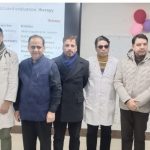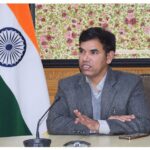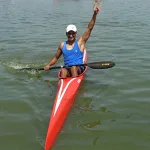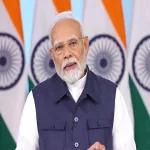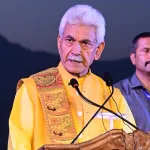Srinagar: As the world marked World Braille Day on Saturday, celebrating the birth anniversary of Louis Braille, the inventor of the Braille writing system, the spotlight turned to the pressing need for reforms for visually impaired individuals in Jammu and Kashmir.
Despite significant central government schemes aimed at supporting differently-abled individuals, the visually impaired community in the region continues to face challenges in accessing basic services and participating fully in society.
Showkat Ahmad Lone, Chairman of the J&K Blind Welfare Trust (BWT), emphasized the gap between policy and implementation. “While policies are in place, their execution on the ground remains limited, and the visually impaired are left to grapple with basic services,” Lone said.
One of the major concerns is the shortage of special schools for blind children. Existing schools often lack the necessary infrastructure and trained staff to provide quality education. “The availability of Braille textbooks is limited, and most educational institutions aren’t equipped to accommodate visually impaired students,” Lone explained. He urged the government to establish more special schools dedicated to blind children.
In addition to the lack of specialized schools, the absence of essential resources further exacerbates the difficulties faced by visually impaired students. Without specialized equipment, mobility training, and access to technology for skill development, blind children face significant disadvantages. “These resources are crucial for helping blind children compete on equal footing,” Lone added.
The challenges in education inevitably translate into limited professional opportunities. For the blind, Braille is more than just a method of reading and writing—it is vital for social integration. However, many mainstream schools in Kashmir lack the resources to teach Braille effectively, forcing visually impaired students into specialized schools. This limited access to education restricts their academic and professional prospects, perpetuating exclusion.
Another pressing issue is the difficulty visually impaired students face during exams, as they often struggle to find a scribe to assist them. Lone also highlighted the need for government-backed skill development programs to open doors to better employment opportunities for the blind.
The employment landscape remains bleak. Lone advocated for increased job reservations in government sectors and a higher monthly pension for the blind, which currently stands at just INR 1,000. “It’s not enough to cover basic living expenses, especially with the rising costs of essentials,” said Altaf, a visually impaired individual. “A pension of INR 4,000 to INR 6,000 would help us manage better,” added Bilal, another visually impaired person.
There is also a growing demand for a dedicated sports board for the blind to promote their participation in national and international competitions. “We appeal to the J&K government to provide blind athletes with the platforms and opportunities they deserve to compete fairly,” Lone said.
Shafat Sofi, a visually impaired activist from Srinagar, echoed these concerns and called for better facilities for blind students. “We want to improve our future, and that begins with proper education and opportunities,” he said.
Attempts to reach authorities for comments yielded no response. Dr. Ghulam Nabi Itoo, Director of School Education Kashmir, could not be reached despite multiple attempts, and Mohammad Akbar Wani, Director of Social Welfare Kashmir, declined to comment.
As World Braille Day highlights the importance of Braille, it also underscores the ongoing challenges faced by the visually impaired in Jammu and Kashmir. The government, alongside NGOs and other organizations, must collaborate to address these issues and work towards a more inclusive society for all.
J&K’s visually impaired community calls for reforms on ‘World Braille Day’

Leave a Comment Leave a Comment


